Drug and Alcohol Rehab in Milton Keynes
Quick links for drug and alcohol rehab in Milton Keynes
- The disease model of addiction at drug and alcohol rehab in Milton Keynes
- Dual Diagnosis at drug and alcohol rehab in Milton Keynes
- The benefits of residential drug and alcohol rehab in Milton Keynes
- Private vs. Council-funded drug and alcohol rehab in Milton Keynes
- Why residential drug and alcohol rehab in Milton Keynes is not for everyone
- The alternatives to going to drug and alcohol rehab in Milton Keynes
- The admissions process for drug and alcohol rehab Milton Keynes
- How much does drug and alcohol rehab in Milton Keynes cost?
- Tips for choosing the right drug and alcohol rehab in Milton Keynes
- How long does drug and alcohol rehab last in Milton Keynes?
Drug addiction and alcoholism help are available for those who need it in the Milton Keynes area. It is important that those who are considering making use of these resources have realistic expectations.
It is best to look at things like alcohol rehabilitation centres and drug counselling primarily as tools to help you beat addiction.
They can be of great help, but at the end of the day, it is still going to be up to the individual to make their recovery a reality. [1]
There is nobody else who will be able to do this work for them.
Drug and alcohol rehab can help with a number of different addictions [2], including:
- Alcohol addiction and binge drinking [3]
- Benzodiazepine addiction
- Buprenorphine addiction
- Cannabis use disorder
- Cocaine addiction
- Crack cocaine dependence
- Codependency
- Heroin addiction
- Ketamine addiction
- Opioid use disorder
- Behavioural addictions like gambling addiction
Whatever your addiction may be, our experts can help you get the specialised treatment you need [4] to overcome it.
A drug and alcohol rehab in Milton Keynes will give you all the rules and structure [5] you need to pursue a healthy, happier life.
Start your recovery journey in Milton Keynes today by calling our expert team on 0800 088 66 86
Addiction Statistics In Milton Keynes

Woman looking down sadly
From 2019 to 2020, there were estimated to be 915 clients in treatmentfor drug and alcohol addiction in Milton Keynes, from a population of 229,941.
That’s without recording all of those who have yet to seek out help.
On a national scale, in 2019/20, 2,152 people aged between 24 and 34 were admitted to hospital due to “drug-related mental health and behaviour disorder”.
There were also 195 admissions for under 16s, 1,646 for 16 to 24-year olds and 1,732 for 35 to 44-year-olds.
This exists alongside a moderate alcohol abuse problem in Milton Keynes [6], which itself can have a significant effect on a person’s life expectancy. [7]
| Drug and Alcohol Crime Statistics in Milton Keynes | Value |
|---|---|
| Annual Crime Rate | 2.6 crimes per 1000 workday people |
| Crime Rate Compared to National | 97% |
| Drug and Alcohol Crime Percentage in Milton Keynes | 2.6% |
| Total Drug and Alcohol Crimes in Milton Keynes | 1.3k |
| Year-over-Year Increase in Drug and Alcohol Crimes | 0.7% |
| Drug and Alcohol Crime Rate in Milton Keynes | 2.6 crimes per 1,000 working people per annum |
| Rank in England and Wales’ Postcode Areas | 45 out of 99 postcode areas |
No matter what age you are, if you find yourself physically or psychologically unable to stop using, you need to seek out help.
For a multitude of reasons, professional drug and alcohol rehab in Milton Keynes is usually the best way to recover from any addiction. All you need to do is reach out.
The full set of facts and statistics for the first report is available here. [8]
To learn more about drug and alcohol rehab treatment in Milton Keynes, call our team on 0800 088 66 86
The disease model of addiction at drug and alcohol rehab in Milton Keynes
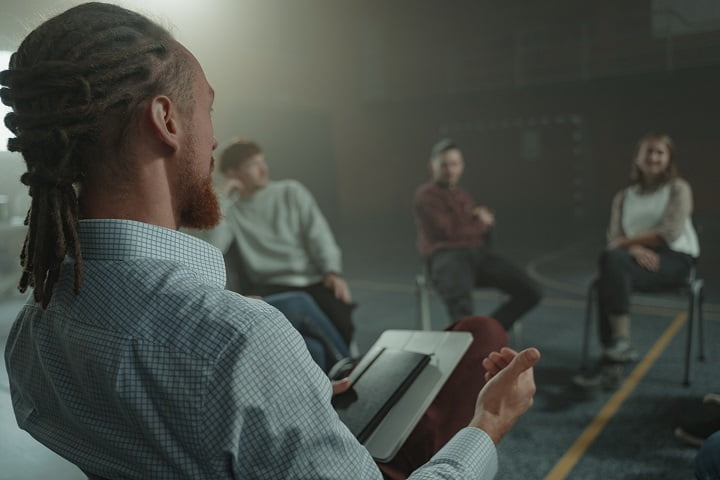
Therapist taking notes during a group session at a drug and alcohol rehab clinic in Milton Keynes
One of the most important things to establish about addiction is that it’s a disease, not a moral failing.
Addiction is defined as a disease [9] because of the way that repeated extreme exposure to drugs and/or alcohol changes your brain.
Reward pathways are blocked, affecting your emotions and creating cravings/psychological withdrawal symptoms when you stop using.
There’s also a distinct difference between use, abuse and addiction. [10] Use simply means using drugs – whether daily [11], weekly [12] or otherwise – while abuse means using to a harmful extent.
Addiction is its own category, defined as a disorder that physically or psychologically prevents you from stopping using.
It’s a condition, like any other. It’s nothing to be ashamed of.
By using the disease model and viewing addiction this way, we’re able to acknowledge the loss of control, whilst also acknowledging that addicts need help.
This viewpoint also takes into account causes of addiction [13] such as genetics, physiology and environmental factors, alongside social problems such as peer pressure [14] and family influence. [15] It looks beyond the initial addiction issue, to try and root out deeper problems.
If you can identify everything that might be causing an addiction, then you’ve got a head start in fighting every part of it.
You can read more about the disease of addiction here. [16]
To learn more about how addiction is treated at drug and alcohol rehab in Milton Keynes, call us on 0800 088 66 86
Dual Diagnosis at drug and alcohol rehab in Milton Keynes
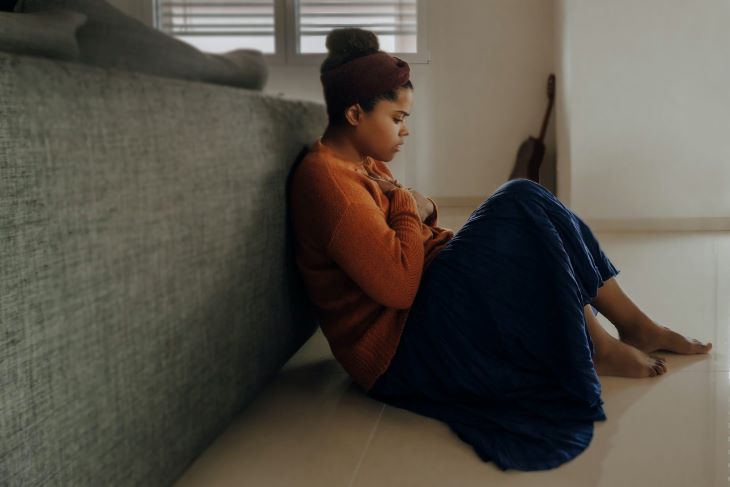
Woman sat on the floor looking sad at a drug and alcohol rehab in Milton Keynes
If you choose to go through treatment [17] at a drug and alcohol rehab in Milton Keynes, a variety of mental health therapies may be presented to you. This is because addiction is nearly always a symptom of deeper issues, mainly underlying mental health problems.
A psychiatric assessment will be carried out by a psychiatrist in order to assess whether you need further psychiatric treatment.
Drug and alcohol rehab aims to treat the various conditions [18] that can drive addiction, such as:
- Anxiety
- Schizophrenia
- Depression
- Bipolar disorder
- Borderline Personality Disorder (BPD) [19]
- Eating disorders
- Obsessive-Compulsive Disorder (OCD)
- Post-Traumatic Stress Disorder (PTSD)
This includes therapy types and counselling techniques such as cognitive behavioural therapy, dialectal behavioural therapy, contingency management and various holistic therapies.
You are also far more likely to suffer from a wide range of physical ailments, including:
- Delirium Tremens
- Hepatitis
- Cancer [20]
- Wernicke-Korsakoff Syndrome [21]
- Heart disease
- High blood pressure [22]
- A weakened immune system
- Brain damage [23]
- Liver disease [24] and cirrhosis [25]
- Digestive issues
- Deficiencies of various essential minerals (Calcium, iron, zinc, magnesium, etc.) [26]
If you get the right help, even the most intense consequences of addiction can be addressed and even potentially reversed. [27]
From the beginning of your drug and alcohol rehab journey, for this reason, it’s very important that you’re open about any mental or physical health issues you have besides addiction.
For more guidance on how mental health is treated at drug and alcohol rehab in Milton Keynes, call us on 0800 088 66 86
Abstinence in drug addiction treatment in Milton Keynes

Woman holding a cup looking at the sea
In the context of addiction treatment, abstinence essentially means staying away from drugs and/or alcohol altogether.
This is the best way to avoid relapse – if you continue to use even in small amounts, it could all too easily lead to relapse later down the line.
Abstinence was first promoted when Alcoholics Anonymous was first founded in 1935, so it has a long history within the rehab process.
There are, of course, alternatives like harm reduction therapy [28] – but we believe that staying far away from drugs and alcohol altogether is the best way forward.
Experts have agreed [29] that abstinence is always the safer and more effective route to addiction recovery.
To learn more about how abstinence can help you beat addiction at a drug and alcohol rehab in Milton Keynes, call us on 0800 088 66 86
The benefits of residential drug and alcohol rehab in Milton Keynes
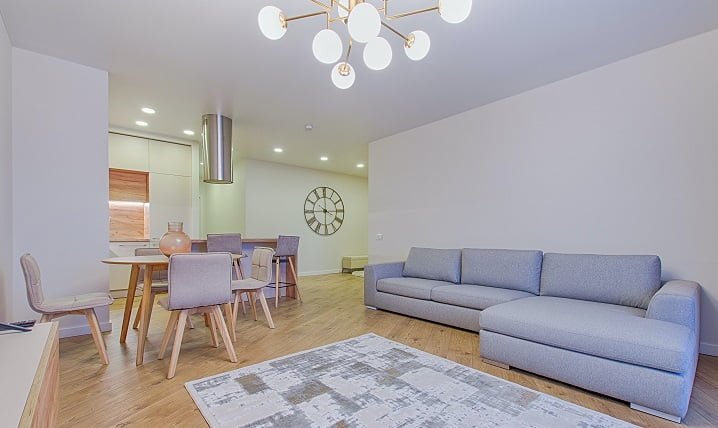
Photo of a living area in a residential drug and alcohol rehab centre in Milton Keynes
Other options, such as inpatient rehab treatment and alcoholics anonymous, are available. But for many people, especially those with more severe addiction issues, residential drug and alcohol rehab in Milton Keynes is the best option.
You’ll be kept far away from temptation and will be in an environment of continual treatment and support.
Residential drug and alcohol rehab in Milton Keynes can also help you reset, and get away from toxic situations.
Going to a completely different environment, fully focused on recovery, could be the key to healing.
You’ll get time to objectively analyse your previous situation, judging what you might need to change personally or professionally once your treatment is over.
You’ll have immediate access to more specialised medical treatment. This is another reason that residential rehab is recommended for people with more advanced addictions.
Finally, you’ll be able to meet a lot more people in similar circumstances to you, who can then be a huge source of emotional support.
Addiction is not considered a ‘choice’ or ‘moral failing’ on behalf of the addiction sufferer [30] – drug and alcohol rehab is about treating the disease of addiction.
Start your recovery journey in Milton Keynes today by calling our expert team on 0800 088 66 86
Private vs. Council-funded drug and alcohol rehab in Milton Keynes
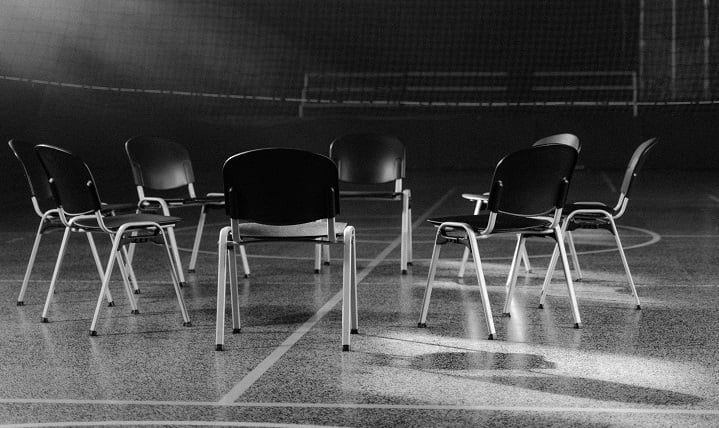
Black and white photo of chairs set up for group therapy at a drug and alcohol rehab in Milton Keynes
There are pros and cons to both council-funded and private drug and alcohol rehab treatment in Milton Keynes.
Services offered by the NHS [31] include recovery and care planning, one-to-one support, medication and support for families. It’s also available to everyone and treatment will always take place within the local community.
If you’re already in a supportive environment and would be more comfortable staying at home in Milton Keynes, this could be a huge benefit.
Private rehab is a lot more specialised and personalised – it often includes increased one-to-one as well as group therapy, in addition to workshops and support groups.
If you go for council-funded treatment in Milton Keynes, you might also have to face long waiting lists. [32] Private drug and alcohol rehab is generally much faster and easier to access.
If and when you choose to get in touch with us at Rehab Recovery, we can help you.
For guidance in choosing between public and private drug and alcohol rehab in Milton Keynes, call us on 0800 088 66 86
Why residential drug and alcohol rehab in Milton Keynes is not for everyone

Support group sat together taking notes at a drug and alcohol rehab centre in Milton Keynes
In spite of our discussions on the benefits of residential drug and alcohol rehab in Milton Keynes, it’s not for everyone. If the following criteria don’t apply to you, alternatives like inpatient rehab treatment or support groups could be a better option.
- If you’re drinking over 30 units of alcohol a day and have co-occurring mental health issues – this is because of the continual access to mental health treatments that residential rehab provides, which might not be necessary in less severe addiction cases.
- If you’ve tried at-home treatment before and have failed to remain sober – here, it makes sense that residential treatment should be the next option.
- If you’ve acted violently towards people you care about due to your addiction – in this case, it’s best to get you out of that
- If you have significant mental health problems and would struggle to do a home detox – in physical addictions, detoxes are incredibly important. Home detoxes can be dangerous at certain stages, due to some of the worst drug or alcohol withdrawal symptoms (alcohol withdrawal syndrome)
- If you experience serious withdrawal symptoms like delirium tremens, hallucinations and seizures, this also applies to you.
- If you’re suffering from Wernicke encephalopathy, a condition caused by thiamine deficiency. Its’ main symptoms are confusion, sight issues and problems with balance, as well as movement. This is particularly linked to alcohol addiction.
The DSM-5 Criteria at drug and alcohol rehab in Milton Keynes
When deciding which option would work best for you, it’s very important that we assess the level of your addiction.
To aid with this, the DSM-IV-TR contains diagnostic criteria for drug and alcohol dependence.
The 11 aspects of it are:
- Hazardous use –This means using to an extent that’s dangerous to your life or health in any way,
- Social or interpersonal problems related to use – Addiction can often do huge damage to your relationships with others. It’s something else to look out for when trying to establish how severe your addiction is.
- Neglected major roles to use – Failing to meet responsibilities you would have previously been committed to be also a major red flag.
- Withdrawal – At a certain stage, when your body has adjusted to whatever you’re addicted to, you might experience withdrawal symptoms if you attempt to stop. Depending on your specific addiction and how severe it is, these could range from tremors to seizures and hallucinations.
- Tolerance – An increased tolerance is also a sign that dependency is developing.
- Used larger amounts – And a key sign of increased tolerance is needing to use larger amounts to get the same effect
- Repeated attempts to control the use or quit – If you’ve tried to quit several times and have failed, you should try and seek out help.
- Much time spent using – The amount of time you spend getting to drugs or alcohol and then using it is also often an issue.
- Physical or psychological problems [33] relating to use – Addiction can lead to a variety of mental health issues, including depression and personality disorders [34].
- Activities are given up to use – Giving up activities you previously enjoyed or were committed to be a sign of mental health issues like depression. It could also be a sign of addiction.
- Cravings – Continuous cravings for drugs and or alcohol are a major symptom of addiction.
To further discuss whether or not residential rehab in Milton Keynes is right for you, call us on 0800 088 66 86
The alternatives to going to drug and alcohol rehab in Milton Keynes

Outdoor picture of a rural drug and alcohol rehab centre near to Milton Keynes
Professionally supported drug and alcohol rehab in Milton Keynes is one of the best ways to recover, for a variety of reasons.
However, there are several alternatives if residential rehab in Milton Keynes isn’t for you.
First of all, you could always receive outpatient treatment at home. This will be completed with the support of a Milton Keynes-based team.
In comparison to the 24/7 care of residential drug and alcohol rehab, it’s less intense in nature. As a result, it’s generally recommended to those with less severe issues.
That of course doesn’t mean that you won’t receive support if you go for inpatient rehab treatment in Milton Keynes. You’ll still have a group of dedicated professionals behind you, supporting you every step of the way.
But more of your treatment will be in your hands.
If you’re struggling to decide between inpatient and outpatient rehab treatment, this is something we can discuss if you get in touch.
It can be a tricky decision to make, especially if you’ve never been through treatment before. You should think carefully, weigh up all of your options and speak to experts, once you’ve given them full context for your situation.
This kind of treatment will also come along with an at-home detox. But if you’re at an earlier stage of addiction, you might even be able to recover with just a detox or alcohol detox.
An alcohol detox includes medical assistance using Chlordiazepoxide (brand name Librium) to help limit withdrawal symptoms.
It should be noted that this is very different to detoxing alone [35], without support. You’ll still have a team guiding you and you’ll have medication to control any withdrawal symptoms too.
Speaking of self-help, SMART Recovery [36] is an organisation that provides an alternative strategy.
SMART stands for Self-Management And Recovery Training. It teaches you to control your own urges, manage negative feelings and addictive behaviours [37], build up your own motivation and eventually live a balanced and healthy life.
Alcoholics Anonymous and Narcotics Anonymous can also give you a great opportunity to share your story, in a private, confidential space in Milton Keynes.
Through these sessions, you’ll also (hopefully) build lasting relationships with people who can truly understand what you’re going through.
Addiction can also have a big impact on the family of the person suffering from it. Al-Anon Family Group meetings can help you to work through any issues left from addiction.
To learn more about alternatives to rehab in Milton Keynes, call our team today on 0800 088 66 86
The admissions process for drug and alcohol rehab Milton Keynes

People taking notes at a drug and alcohol rehab in Milton Keynes
If and when you choose to contact Rehab Recovery, we can work with you to develop a full treatment plan.
But first, we need to learn a bit more about your specific situation, to decide what kind of treatment in Milton Keynes you might need.
The ASAM Criteria at drug and alcohol rehab in Milton Keynes
The ASAM patient placement criteria have six dimensions, to help assess the severity of any addiction. Along with the essential questions they ask, these are:
- Acute intoxication and/or Withdrawal Potential – What potential do you have for withdrawal symptoms?
- Biomedical conditions and complications – What other physical conditions do you have that could influence your recovery?
- Emotional behavioural or cognitive conditions or complications – Do you have any underlying mental health issues?
- Readiness to change – How willing are you to change any circumstances that could be driving your addiction, as well as the addiction itself?
- Relapse, continued use or continued problem potential – How at risk will you be for relapse, or other continued issues?
- Recovery and living environment – What do your current living circumstances look like? Could they influence your addiction?
The DSM-5 also has Three Levels of Severity, which allow us to categorise your addiction. The first, 0.5, is “At Risk”, 1 is “Mild”, 2 is “Moderate” and 3 is “Severe”.
Once we’ve labelled your addiction with one of these, it will be much easier to judge what kind of treatment you might need.
“At risk,” for example, might only require an at-home detox. A mild addiction might also only require outpatient drug and alcohol rehab treatment.
At the same time, residential rehab is generally recommended for those with moderate or severe dependencies.
To learn more about the admissions process at drug and alcohol rehab in Milton Keynes, call us on 0800 088 66 86
The Alcohol Use Disorders Identification Test (AUDIT) at drug and alcohol rehab in Milton Keynes
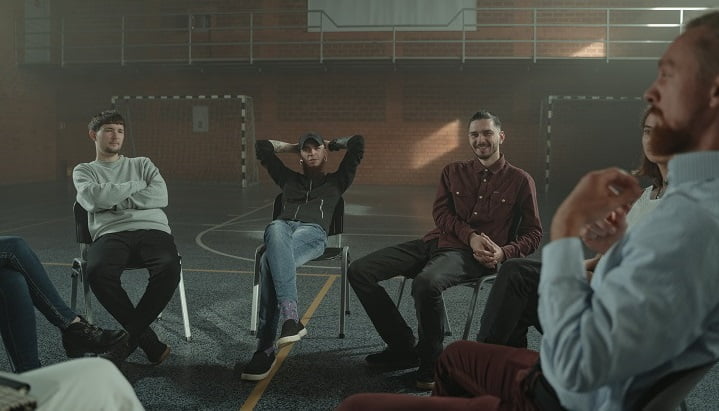
Support group smiling together at a drug and alcohol rehab in Milton Keynes
Often shortened to AUDIT, The Alcohol Use Disorders Identification Test consists of 10 questions, all about your alcohol use and its consequences.
A scoring system from 0 to 4 is used, with 4 answers to choose from for each question. This then adds up to an overall score.
If you get 0 to 7, that means you’re low risk. A score of 8 to 15 means an increased risk.
16 to 19 means a higher risk. And 20 or more is taken as an indication of dependence.
When assessing any addiction, the first and most important thing to look at is how much you’re drinking in the first place.
As a result of this, questions 1-3 specifically focus on intake.
They are:
- “How often do you have a drink containing alcohol?”
- “How many units of alcohol do you drink on a typical day when you are drinking?”
- “How often have you had 6 or more units if female or 8 or more if male, on a single occasion in the last year?”
Questions 4-6 then move on to dependency. Dependency is the stage where you’re reliant on alcohol, or whatever else you’re addicted to.
If you have a dependency, you’ll find that physical and psychological symptoms will stop you from quitting.
By asking the following, we’ll be able to see how reliant you truly are on alcohol:
- “How often during the last year have you found that you were unable to stop drinking once you had started?”
- “How often during the last year have you failed to do what was normally expected of you because of your drinking?”
- “How often during the last year have you needed an alcoholic drink to get yourself going after a heavy drinking session?” [38]
Alcohol doesn’t just affect your health. It can have serious consequences for your personal and professional life.
It could affect your job. It could get yourself or others hurt. Overall, it could change or influence your behaviour, in ways you wouldn’t want or expect.
The final round of questions, 7 to 10, focuses on this, asking:
- “How often during the last year have you had a feeling of guilt or remorse after drinking?”
- “How often during the last year have you been unable to remember what happened the night before because you had been drinking?”
- “Have you or somebody else been injured as a result of your drinking?”
Has a relative or friend, doctor or other health worker been concerned about your drinking or suggested that you cut down?
The CAGE Questionnaire [39] can also be used to assess an alcohol addiction.
For more information about diagnosing addiction in Milton Keynes, call us on 0800 088 66 86
Holding a professional intervention in Milton Keynes
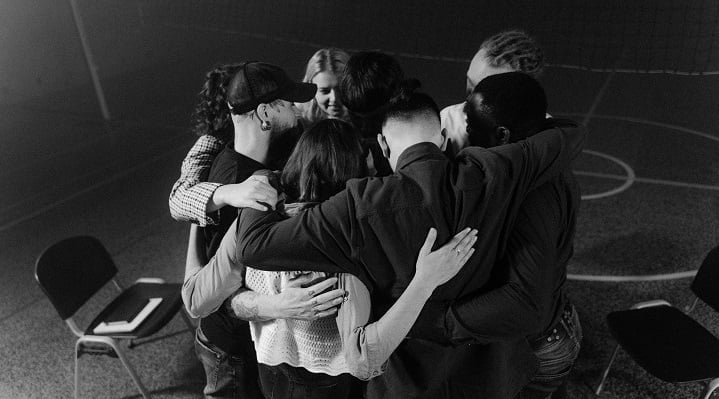
Black and white photo of a support group embracing at a drug and alcohol rehab clinic in Milton Keynes
Spotting the signs of addiction in a loved one can be a difficult task, [particularly given that symptoms can change depending on a wide range of factors.
For example, some alcoholics will show signs of anxiety and low novelty-seeking [40] during their alcohol abuse, whilst others will show signs of high novelty-seeking and low levels of anxiety. [41]
Some people can drink every day and not develop alcohol addiction [42], whereas others need very little for their use to become problematic.
This is why it is important for individuals to know exactly what to look for when it comes to addiction, and what to do when they are concerned.
For people who are concerned for someone else instead of themselves, an intervention can always be a good option.
Led by a professional interventionist working in Milton Keynes, a typical intervention meeting will be a clear and directed conversation [43] with the person you’re concerned about.
If there’s a group of you, you’ll gather together. You’ll read out a letter to the subject of the intervention, highlighting your concerns, the ways that the addiction has hurt you and how you’d like to move forward.
The intention is to make someone who won’t wake up realise that they need help. Hearing an outside perspective from people they care about could completely turn their viewpoint around.
Many people dealing with the addiction of a loved one will try to simply speak to them about it. This is something you should always try first, to at least get the issue out into the open.
But many of these conversations, unfortunately, end in anger and denial from the person who needs help, preventing them from taking that essential first step towards sobriety. [44]
That’s where intervention comes in and can save lives.
If you feel like a traditional intervention would be too confrontational, there’s always the CRAFT approach. [45]
CRAFT stands for Community Reinforcement And Family Training.
It generally encourages families to develop their communication and learn how to better help the person suffering from addiction.
Reinforcement of positive steps forward and discouragement of bad behaviour is also important here.
For more guidance holding an intervention in Milton Keynes, call our team on 0800 088 66 86
How much does drug and alcohol rehab in Milton Keynes cost?
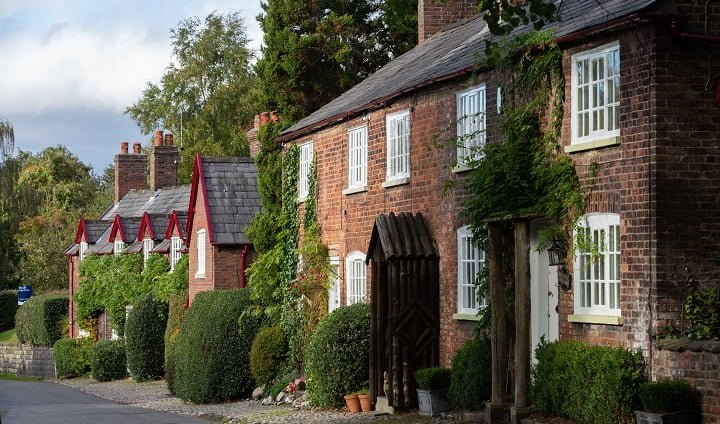
Outside picture of a drug and alcohol rehab in Milton Keynes
The cost of drug and alcohol rehab in Milton Keynes will likely vary based on a few factors.
This can include the kind of treatment you go for, what kind of room you get if you choose residential rehab and how long your treatment lasts.
Of course, it also changes based on the organisation you go to.
On average, a 10-day detox in residential drug and alcohol rehab with a single occupancy room will range from £3,000 to £6,000. If you go for the same detox length with multiple occupancies, it then usually goes down to £2,000 to £4,000.
A lot of addictions will require a longer time than 10 days.
We also recommend that you go through relevant mental health treatments alongside a detox, as it’s an underlying cause of so many substance and alcohol abuse issues.
A 28-day stay with single occupancy will normally be £8,000 to £12,000 for single occupancy and about £6,000 for multiple occupancies.
Finally, as we’ve said previously if your addiction is mild enough you might only need an at-home detox. That typically costs about £1,500.
To get a more accurate estimation of how much rehab will cost you, call us on 0800 088 66 86
Tips for choosing the right drug and alcohol rehab in Milton Keynes
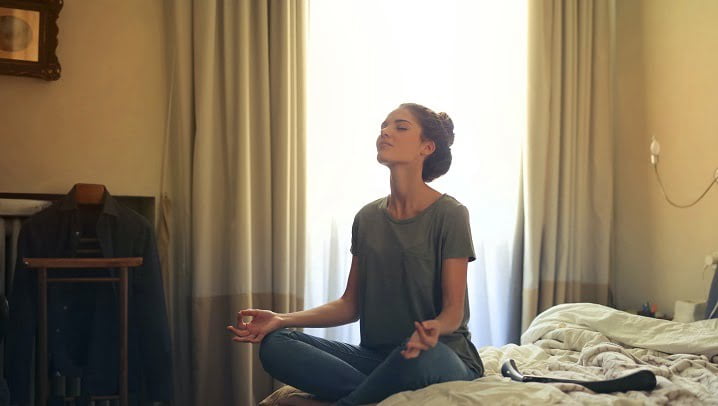
Woman meditating at a residential drug and alcohol rehab in Milton Keynes
When looking into drug and alcohol rehab options in Milton Keynes, it can be difficult to know which one to choose. Here, we’ve gathered some of our best tips for this early but vital stage.
First of all, you need to look at the success rates of every place you’re considering. What are their statistics? On a similar note, what reviews do they have, if there are any available?
Look into prices too – try to find one that’s affordable for you.
A long track record is also a good sign, as it shows a good level of experience, in both staff and the organisation and a whole.
You should also note down contact details and then speak to each of them. Choose whichever one you feel most comfortable with after an actual conversation.
To find out a little more about choosing the right rehab in Milton Keynes, call us on 0800 088 66 86
Detox in Milton Keynes
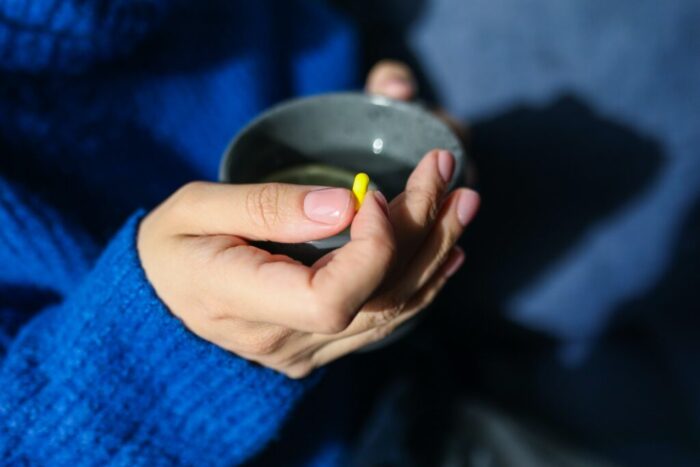
Person taking a pill at a drug and alcohol rehab clinic in Milton Keynes
If you’re at a stage of addiction where you’ve developed a physical dependency, you’ll likely need a detox at the start of your addiction treatment in Milton Keynes.
Withdrawal symptoms occur as your body adjusts to your usual intake of drugs or alcohol. You then get a reaction, which could then manifest in a variety of symptoms if you suddenly and completely stop using.
Depending on what you’re addicted to and how severe your addiction is, symptoms can range from sweating, headaches and nausea to seizures, hallucinations and delirium tremens.
Specific common withdrawal symptoms for alcohol include:
- Vomiting
- Headaches
- Nausea
- Anxiety
- Shaking hands
- Insomnia
- Sweating
During detox, we’ll attempt to avert these symptoms through a slow and steady decrease in your intake.
For alcohol specifically, we’ll follow a Librium-based detox over a 10-day period. You may also be given medications such as Acamprosate [46], Naltrexone [47] and particular antidepressants [48] or anti-anxiety medications [49] when necessary.
After that, to deal with the psychological issues behind your addiction through mental health and other treatments, we recommend a further 3 weeks.
Aftercare is a third and final period, to help you transition post-rehab. Relapse prevention planning and trigger identification are a huge part of this process.
We’ll work to identify your triggers and help you to understand their symptoms.
This then means that you’ll be able to instantly recognise early warning signs and will have the coping strategies to work through them.
To learn more about the whole addiction treatment process in Milton Keynes, call us on 0800 088 66 86
How long does drug and alcohol rehab last in Milton Keynes?
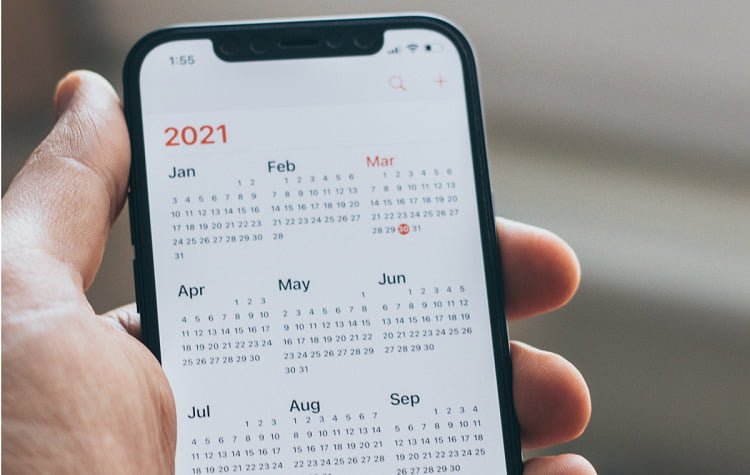
Person looking at the calender on their phone at a drug and alcohol rehab clinic in Milton Keynes
Overall, the time spent in drug and alcohol rehab varies quite a bit from case to case.
Whilst recovery from addiction itself can last anywhere from six months to five years [50] or longer, formal treatment will almost never be this long.
Alcohol detox in particular lasts for a minimum of 7 days. But, as we said in the segment on detoxing, we then recommend further treatments.
This then brings the time for alcohol in particular up to a minimum of 28 days.
Some addictions, like cocaine, cannabis and amphetamines, don’t require a medical detox at all. In those cases, you won’t be at risk from physical withdrawal symptoms.
So that then means you can go straight to therapy and counselling, as well as other treatments like support groups, workshops and physical therapies.
For a more accurate estimation of how long rehab in Milton Keynes will take, call us on 0800 088 66 86
Rehab for Cocaine in Milton Keynes

Patient and therapist talking together at a drug and alcohol rehab in Milton Keynes
We’ve already established here that cocaine isn’t physically addictive.
It affects your brain, triggering key pleasure centres and creating a process of “positive reinforcement”.
The “positive” effects, such as an increase in energy and a feeling of euphoria, encourage you to take more and more.
This then means that, like with many other addictions, your tolerance increases. A cycle is then created, where you take more and more to get the same effect until your use reaches more and more dangerous levels.
If you suddenly stop taking it, you won’t experience any physical withdrawal symptoms. But you may still experience intense cravings and it’s important that you safely withdraw, with full support.
Some of the most significant behavioural signs of cocaine addiction are:
- Elevated body temperature
- Acting impulsively
- Increased energy and rapid talking
- Poor decision making
These changes in behaviour can also massively influence both your personal and professional life.
To begin your journey away from cocaine addiction in Milton Keynes, call us on 0800 088 66 86
Rehab for Heroin in Milton Keynes

Support group talking together at a drug and alcohol rehab in Milton Keynes
Heroin is physically addictive, meaning a detox is needed first of all.
If you inject heroin, this can also result in an increased risk of getting hepatitis.
Some of the physical withdrawal symptoms for heroin specifically include:
- Nausea
- Sweating
- Shaking
- Muscle spasms
- Abdominal pain
During heroin detox, you’ll be given medication that will curb the worst of your heroin withdrawal. Like in all other detoxes, we’ll also slowly and safely reduce your intake for the same reasons.
You may however experience flu-like symptoms during your heroin detox period, which usually lasts 7 to 10 days.
Then, you’ll move on to counselling and therapy, alongside support sessions and group activities.
To begin your journey away from heroin addiction in Milton Keynes, call us on 0800 088 66 86
Rehab for Cannabis in Milton Keynes
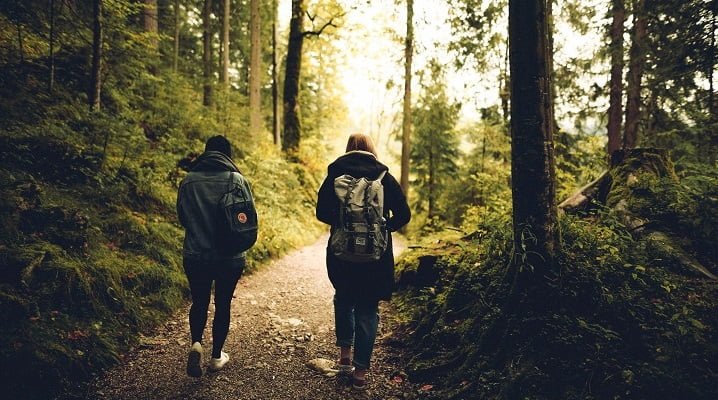
Two people walking through the forest during outdoor therapy at a drug and alcohol rehab in Milton Keynes
Like cocaine, cannabis doesn’t produce physical withdrawal symptoms – but that doesn’t mean it isn’t a dangerous addiction to have.
Many people take cannabis socially, believing that it’s completely harmless – but around 30% of cannabis users have some kind of use disorder.
A lack of physical withdrawal symptoms also doesn’t mean that cannabis can’t do long term physical damage.
Some of the worst health impacts after a long period of intense use could include digestive, respiratory, circulatory and immune problems.
And that’s without even going into the effects it has on your brain in the most severe cases, including impaired judgement, anxiety, depression, hallucinations and memory loss.
If your cannabis use is an impairment of your life and usual daily activities, it could be a good idea to seek out help.
An increased tolerance (ie needing to take more to get the same effect), is also a sign of developing dependency.
To begin your journey away from cannabis addiction in Milton Keynes, call us on 0800 088 66 86
Treatments available at drug and alcohol rehab in Milton Keynes
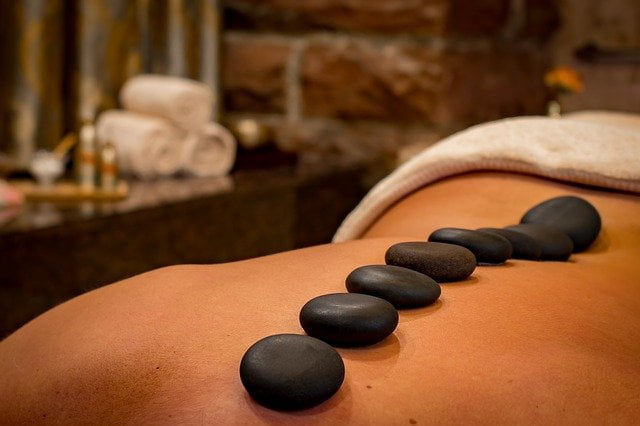
Person receiving a hot stone massage during holistic therapy at a drug and alcohol rehab clinic in Milton Keynes
There are many mental health treatments available through drug and alcohol rehab in Milton Keynes, including:
Twelve-Step Facilitation Therapy (TSF) – The 12-step programme is probably one of the best-known forms of addiction treatment out there.
As the name would suggest, it consists of 12 stages, all designed to get you a bit closer to recovery.
More specifically, these 12 steps are:
- Admitting that you have a problem
- Accepting a higher power
- Surrendering yourself to that higher power
- Identifying your problems
- Admitting your faults – to yourself, your chosen higher power and to someone else
- Acknowledging your faults and moving forward in spite of them
- Asking your higher power for help with things you can’t manage yourself
- Making a list of people you might have harmed before you started treatment
- Making amends to the people on your list
- Taking a personal inventory and once again admitting your faults
- Figuring out the plan your chosen higher power has for your life
- Continuing to grow and taking the life lessons you’ve learned so far to others.
Other types of therapies offered at drug and acohol rehab in Milton Keynes include:

Two people having a serious conversation at a drug and alcohol rehab in Milton Keynes
- Cognitive behavioural therapy – Often, toxic thinking and behaviour patterns can lead you into a spiral that hinders recovery. CBT aims to work on that, by specifically rooting out your toxic habits. It has an extremely high success rate [51], with low chances of relapse [52] for those who successfully complete a course. However, some individuals will find it is naturally less effective for them. [53]
- Dialectical behavioural therapy – In dialectal behavioural therapy, you’ll learn to regulate your emotions. It uses the same model as CBT, but for a different purpose.
- Brief interventions – Brief interventions are 15 to 20-minute conversations, designed to make you think about the harm your addiction might be doing. These sessions are usually done in a clinical setting and are led by doctors. Questions are likely to revolve around your consumption and the way it affects your life. Although you’re the one being asked the questions, answering them may make you think about the real impact of your issues.
- Motivational interviewing – Funnily enough, motivational interviewing is similar to a brief intervention in some ways. During sessions with this counselling technique, you’ll be asked a series of non-judgmental questions focusing on your addiction. The idea is to make you reassess your current situation. This new perspective is often vital in recovery [54], as it will lead to you enthusiastically making changes in your life that will eventually lead you to recovery.
- Holistic therapies – The term holistic comes from the Greek word “holos”, meaning whole. Holistic therapy is a term for any mental health treatment that focuses on the whole self. Activity-based treatments like equine therapy, music therapy, drama therapy, art therapy and adventure therapy tend to fall under this umbrella. By engaging you in activities that help you to re-focus on yourself, these all help you to heal.
- Group therapy – Group therapy and group activities can also you to engage with people in similar circumstances. Addiction all too often isolates its victims, leaving them to feel like they’re alone. Group therapy and support groups will show you that you’re not.
- Individual therapy – Having said that, some issues are better dealt with through private, one to one therapy. These sessions will put the focus solely on you, something often needed as addiction is such an individualised disorder.
- Family therapy – Addiction can also create unhealthy family structures and can cause trauma for people around the addict. Family therapy is designed to help with this, as it will allow everyone to work through their issues in a supporting structure.
- Co-dependency treatment – Co-dependency is an unhealthy and one-sided relationship structure, where one person’s needs are continuously put over another’s. This is often something that can arise from addiction and it can also be treated with talking therapy, where you’ll discuss and work through these issues with professional guidance.
Some other treatments and therapies offered at drug and alcohol rehab include:
- Acceptance and Commitment Therapy
- Acupuncture
- Contingency management
- Brief intervention
- Dialectical behaviour therapy
- Eye Movement Desensitization and Reprocessing
- Group psychotherapy
- Motivational therapy
- Motivational interviewing
- Rational Emotive Behavior Therapy
- Talking therapies
To begin your addiction treatment in Milton Keynes, call us on 0800 088 66 86
Relapse prevention plans at drug and alcohol rehab in Milton Keynes

Woman taking notes in a garden at a drug and alcohol rehab clinic in Milton Keynes
Once you’re past the initial stages of drug and alcohol rehab, preventing relapse is also very important as staying sober could be a difficult task. [55]
This is because addiction, while it can be effectively managed, cannot be fully cured. [56]
Several important aspects need to go into any effective relapse prevention plan, particularly accounting for any lifestyle changes you might need to make once you’ve finished your initial treatment should be high up on the priority list.
This includes personal and professional decisions – it could encompass your social life, your work or even where you live.
If anything in your outside life is worsening your addiction, you might need to reconsider it once your initial treatment is done.
Learning what your personal triggers and cravings are is also important to this part of the process.
Strategies to help you with this are also often included. One of the most popular is HALT, which stands for Hungry, Angry, Lonely and Tired.
These are all feelings that could trigger a relapse if they’re left to fester. In rehab, using this strategy, you’ll learn how to identify and process these feelings before they cause any harm.
Stress can also be a huge trigger point for a lot of people. The biggest strategy to help with this is mindfulness meditation, which allows you to refocus on intense situations.
Finally, we’ll develop a plan in case you do relapse. This includes contact details of anyone you might need to get in touch with, alongside a step-by-step strategy.
To find out more about how drug addiction treatment in Milton Keynes can help you avoid relapse, call us on 0800 088 66 86
How to Get the Most Out of Addiction Treatment Options at rehab in Milton Keynes

Person reading a book next to a fire at a drug and alcohol rehab centre in Milton Keynes
What follows are a few suggestions for how people living in the Milton Keynes area can get the most out of their recovery options:
- If people have too many opinions about things then this can get in the way of recovery. The best approach is to have an open mind and be willing to give anything that might help a try. Addicts tend to be cynical and suspicious of new things, but it is important that they be open to the new tools that may be able to help them build a good recovery.
- Nobody would choose to enter an alcohol or drug rehab clinic unless they really needed to, but the reality is that in order for the individual to get the best possible start in recovery it will often be necessary for them to take this step. An inpatient rehab program provides the best possible environment for those who hope to end their addiction.
- There is no one option that is going to work for everyone in recovery. This means that the individual will have to consider what is available and choose the options that are most likely to work for them. This decision has to be taken based on the effectiveness of the solutions in regards to the individual’s needs. It is usually best to assess the available options with the help of an addiction expert or therapist.
- The key to success in recovery is always going to be the individual’s willingness to change. Those who are resistant to getting better or are ambivalent towards their recovery will be less likely to succeed. The person needs to completely let go of the idea that they will ever be able to drink normally or use drugs safely again. It is best that they walk away from that part of their life completely and for good.
- In groups like Alcoholics Anonymous, they recommend that members stick with the winners, and this is good advice for anyone in recovery. The reality is that humans are greatly influenced by the people they spend most of their time with. This means that being around negative people can cause the individual to feel negative about things as well. This is why it is so important to have friends who are doing well in recovery and have a positive outlook on life. These individuals can be inspirational, and they motivate the individual to keep working hard at their recovery.
Get more out of rehab in Milton Keynes today – call our expert team on 0800 088 66 86
Do I need to detox in Milton Keynes?

Woman meditating next to a lake at a luxury drug and alcohol rehab in Milton Keynes
If people decide that they are ready to break away from addiction, they often become worried about withdrawal symptoms.
In most instances, these symptoms will not be much worse than flu symptoms, but if the individual has been using alcohol or certain drugs (e.g. barbiturates) they run the risk of developing a severe form of withdrawals known as delirium tremens (DTs).
These symptoms can be life-threatening and such individuals will certainly want to have their detox medically supervised.
Even if the individual is not at risk of DTs there are still good reasons for why they might want to choose to detox at a drug and alcohol rehab, including:
- It is during the withdrawal stage that people are most likely to relapse. The individual knows that if they take alcohol or drugs they will be able to stop the symptoms, and they will be tempted to do this. By entering a proper detox clinic the individual is protected from the usual temptations, and they are far less likely to relapse.
- One of the benefits of going through detox in rehab is that the individual can start on their treatment program right away. They will be able to attend group therapy sessions and other recovery activities while still dealing with symptoms. This not only means that they can complete the treatment program sooner, but it should also mean that they find the detox process a bit easier.
- The individual will usually be medically supervised, and the doctor will often be able to prescribe pharmaceutical agents that will make the process of going through withdrawals much easier to deal with.
- The person will be in a therapeutic environment where they will get plenty of support and encouragement. This will further increase the likelihood that they make it through the withdrawal stage and are ready for long-term recovery.
To find out whether or not you will need to undergo detox at rehab in Milton Keynes, give our team a call on 0800 088 66 86
Sober Living in Milton Keynes

Two people drinking hot drinks and sat with a dog at a residenial drug and alcohol rehab centre in Milton Keynes
Once the individual has progressed through drug and alcohol rehab, they will then be ready for a sober existence back in their own community. This is when the real work begins.
It is helpful to think of rehab as a type of training ground, but it is only really when the person goes home that they are ready to put their training to good use.
Recovery is a process and not an event, so the individual will still have plenty of work to do in order to sustain their recovery and begin to build a good life.
The first part of recovery is becoming physically sober, and this process can be completed in a relatively short time.
The individual will still have to become emotionally and mentally sober though, and this can take significantly longer to achieve.
Attending drug and alcohol rehab will certainly get the ball rolling, but the real work only begins when the person is back home in their community.
Sober living houses may also be available to you after you leave rehab in order to continue your sobriety.
To learn more about how to stay sober after rehab in Milton Keynes, contact our team on 0800 088 66 86
Drug & Alcohol Charities & Organisations in Milton Keynes
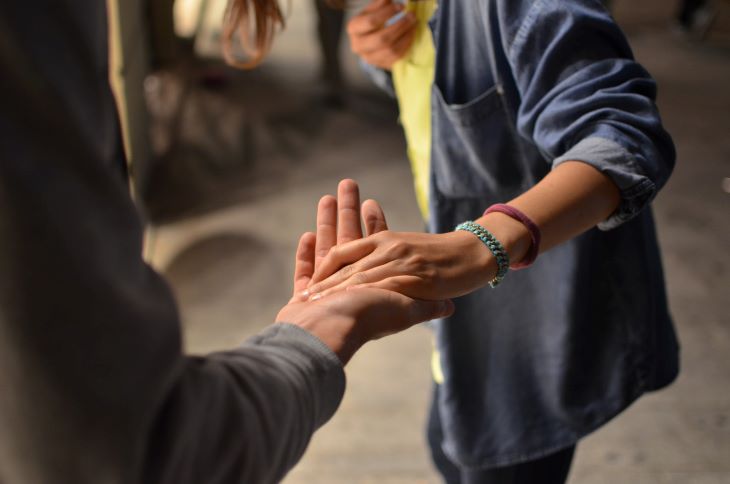
Two people holding hands at a drug and alcohol rehab clinic in Milton Keynes
Various free and NHS-run drug and alcohol rehab treatment services operate in and around Milton Keynes, including some of the following:
1. Path 2 Recovery
Address: 67 High St N, Dunstable LU6 1JF
Telephone: 03333 324 019
Website: https://changeyourtomorrow.co.uk/#areas/elft/pages/Home
2. Northampton Substance to Solution | Change Grow Live
Address: Spring House, 39 Billing Road, Northampton, NN1 5BA
Telephone: 01622 221 676
3. Oxfordshire Roads to Recovery – Banbury Hub | Turning Point
Address: Part Second Floor, Banbury Health Centre, 58 Bridge Street, Banbury OX16 5QD
Telephone: 01295 225 544
Website: https://www.turning-point.co.uk/find-a-service.html#/
Attending local 12-Step programmes such as Alcoholics Anonymous (AA), Narcotics Anonymous (NA), Alateen or Cocaine Anonymous can be a great way to meet other people with similar goals. You and your friends and family members may also benefit from Al-Anon meetings or going to organisations like We Are With You.
Rehabs and organisations follow guidelines from the American Society of Addiction Medicine, National Association for Children of Alcoholics, National Institute for Health and Care Excellence and the NHS Foundation Trust so you are in good hands with person-centered care.
For mental health support, reach out to Mind, Papyrus, Rethink Mental Illness, Young Minds and Samaritans .
Contacting Rehab Recovery

Woman typing on a phone at a drug and alcohol rehab in Milton Keynes
For more information on drug and alcohol rehab options in Milton Keynes, contact Rehab Recovery today on 0800 088 66 86.
When you contact us, we’ll outline a variety of treatment options that are available to you in Milton Keynes. This includes both private and statutory addiction treatments that help to find the coping mechanisms that work for you.
All rehabs we work with are regulated by the Care Quality Commission (England and Wales) [57] or the Care Inspectorate (Scotland) [58].
We also offer our drug and alcohol rehab services across various locations in Buckinghamshire, including Bletchley, Wolverton, Newport Pagnell, Stony Stratford, Bedford, Milton Keynes, Aylesbury, High Wycombe, Beaconsfield, Amersham, Ackhampstead, Addingrove, Adstock, Akeley, Beamond End, Beanhill, Milton Keynes, Bedgrove, Aylesbury Vale, Bellingdon, Chiltern District, Bennett End, Dadford, Stowe, Aylesbury Vale, Dagnall, Egypt, South Bucks District, Fleet Marston, Flowers Bottom, Ellesborough, Gayhurst, George Green, Haddenham, Halton, Ibstone, Ickford, Lathbury, Latimer and Buckingham.
At Rehab Recovery, we offer free advice from a team of non-judgemental professionals, many of whom are in recovery and understand how hard it can be to change your relationship with addiction.
For more information about rehab in Milton Keynes, simply reach out to our 24/7, confidential hotline on 0800 088 66 86.
References
[1] https://nida.nih.gov/research-topics/recovery
[2] https://www.ncbi.nlm.nih.gov/pmc/articles/PMC5328289/
[5] https://www.ncbi.nlm.nih.gov/pmc/articles/PMC4553654/
[7] https://www.ncbi.nlm.nih.gov/pmc/articles/PMC4402015/
[9] https://nida.nih.gov/publications/drugs-brains-behavior-science-addiction/drug-misuse-addiction
[10] https://www.edu.gov.mb.ca/k12/cur/physhlth/frame_found_gr11/rm/module_e_lesson_2.pdf
[11/12] https://www.niaaa.nih.gov/alcohol-health/overview-alcohol-consumption/moderate-binge-drinking
[13] https://medlineplus.gov/ency/article/001522.htm
[14] https://nida.nih.gov/publications/drugfacts/understanding-drug-use-addiction
[16] https://scholar.google.co.uk/scholar?hl=en&as_sdt=0%2C5&q=alcohol+rehab&btnG=
[18] https://www.niaaa.nih.gov/publications/brochures-and-fact-sheets/understanding-alcohol-use-disorder
[19] https://iv.iiarjournals.org/content/24/5/761
[20] https://www.apa.org/topics/substance-use-abuse-addiction/alcohol-disorders
[21] https://premierneurologycenter.com/blog/neurologic-diseases-associated-with-alcohol-consumption/
[22] https://web.archive.org/web/20240306215422/https://www.cdc.gov/alcohol/fact-sheets/alcohol-use.htm
[23] https://www.niaaa.nih.gov/publications/alcohol-and-brain-overview
[24] https://www.ncbi.nlm.nih.gov/pmc/articles/PMC3321494/
[25] https://www.cdc.gov/alcohol/fact-sheets/womens-health.htm
[26] https://pubs.niaaa.nih.gov/publications/aa22.htm
[28] https://www.health.harvard.edu/staying-healthy/11-ways-to-curb-your-drinking
[29] https://scholar.google.com/citations?hl=en&user=VHMpXXIAAAAJ
[30] https://scholar.google.co.uk/citations?hl=en&user=4iN7MOMAAAAJ
[31] https://www.nhs.uk/Live-well/addiction-support/drug-addiction-getting-help/
[33] https://pubs.niaaa.nih.gov/publications/aa63/aa63.htm
[34] https://www.ncbi.nlm.nih.gov/pmc/articles/PMC6241194/
[36] https://uk.meetings.smartrecovery.org/meetings/?location=Milton%20Keynes&coordinates=50
[37] https://www.ncbi.nlm.nih.gov/pmc/articles/PMC3654310/
[38] https://www.nhs.uk/live-well/alcohol-advice/the-risks-of-drinking-too-much/
[39] https://www.mdcalc.com/calc/1729/cage-questions-alcohol-use
[40 /41] https://www.ncbi.nlm.nih.gov/pmc/articles/PMC6876531/
[43] https://www.ahrq.gov/prevention/guidelines/tobacco/5steps.html
[44] https://www.mountsinai.org/health-library/selfcare-instructions/deciding-to-quit-drinking-alcohol
[45] https://www.verywellmind.com/the-craft-approach-to-substance-abuse-intervention-5191125
[46] https://effectivehealthcare.ahrq.gov/products/alcohol-misuse-drug-therapy/consumer
[47] https://www.aafp.org/pubs/afp/issues/2016/0315/p457.html
[48] https://agapetc.com/what-is-the-best-antidepressant-for-an-alcoholic/
[49] https://www.ncbi.nlm.nih.gov/pmc/articles/PMC5614930/
[50] https://www.racnj.com/the-five-stages-of-addiction-recovery/
[51] https://gpsych.bmj.com/content/32/5/e100087
[52] https://pubmed.ncbi.nlm.nih.gov/32954958/
[53] https://www.ncbi.nlm.nih.gov/pmc/articles/PMC7001356/
[54] https://www.ncbi.nlm.nih.gov/pmc/articles/PMC6760428/
[55] https://www.newdirectionsforwomen.org/what-percentage-of-alcoholics-recover/
[56] https://nida.nih.gov/publications/drugs-brains-behavior-science-addiction/treatment-recovery


